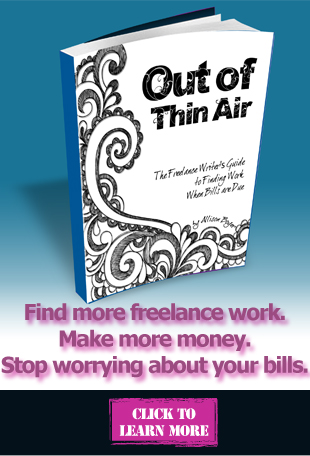I read a comment on another blog recently where the reader accused the blogger of being…well…stale. He noted that the blogger wasn’t saying anything useful, just rehashing old topics that we read everywhere on freelance writing sites. To be honest, the guy was right. There was nothing mind-blowing about the post, which I believe was about the importance of social media.
But there’s a reason that the same old topics get covered again and again and again - they really are the building blocks of being a successful freelancer. To old professionals, these posts my seem like “well duh” moments, but if you’re new to the business, there’s no reason you should know all of these things. We’re not born understanding how to create good web content. We learn it. Bloggers cover these topics because they know that not everyone understands their importance.
There are probably more than ten “oldies but goodies” out there when it comes to rules for writing web content, but these are the ones that I find most relevant. Yes, I understand that if you’re a seasoned web content writer, you probably already follow most of these rules, so it isn’t something earth-moving for you to read.
But if you’re new, this will give you a great introduction to what you need to keep in mind when writing for this industry. Here are my Ten Commandments for Web Content:
1. Thou shall have no other priorities.
Before you get all up in arms, let me explain this commandment. Of course your family, health, etc should come before your work as a writer. However, when you make a commitment to a client to meet a certain deadline, you have to meet that deadline if you want to be successful in this business. If that means staying inside and working even though the weather is nice, so be it. Every writer occasionally misses a deadline, but if you do it more than once or twice a year, you’ll quickly find yourself without work.
2. Thou shall not work with false idols.
Before you even write a word, consider the clients that you’re choosing. You do have a responsibility as a writer to work with reputable people. Academic paper writing companies, those selling illegal products, and clients who want you to change the wording of another’s work to beat plagiarism checkers are among some of the people who shouldn’t be on your schedule. The Internet is already filled with crap. Don’t be part of the problem.
3. Thou shall not make wrongful use of grammar and spelling.
In other words, EDIT. If you aren’t a good self-editor, invest in the services of a third party to read through all of your stuff. In print media, your work will be edited by multiple people. When you write web content, a client wants to receive a perfect copy every time. Of course typos will get through occasionally (and everyone understands that), but your work needs to be clean 99% of the time.
4. Remember your days off and keep them holy.
One of the biggest problems for new web content writers is burnout. You need to work enough to pay your bills, but scheduling days off (or at least, a little time off every day) is an absolute must. Don’t pack your schedule so full that you start to hate your job.
5. Honor those who have come before you.
There’s a lot of good advice to be had out there if you’re willing to listen to it. Freelance web content writers who have their own blogs or companies share great tips on their websites. They aren’t pulling this advice out of thin air - it has proven to work for them. In addition, ask questions of your clients before you start any project. Are there samples available of work they liked in the past? Can they give you the addresses to some sites that they look up to? What have past writers done that has created problems? You should always be continuously improving yourself in general and for specific clients.
6. Thou shall not murder great writing with horrible layout.
Web content creation is as much about layout as it is about the words you write. Long paragraphs with no pictures, headings, or bullet points can kill the reader’s desire to actually read your work. You can’t go about writing web content like you’d write a novel. Break up the text and make your articles as skimmable as possible.
7. Thou shall not work without a contract.
In the religious world, this commandment tells you not to commit adultery, or break a relationship contract. In the freelance world, I’m telling you not to break your contract with a client. To make that possible, you need a contract in the first place. If you work without a contract, you leave yourself open for a whole host of problems, including having your work stolen and not getting paid. You need a contract that outlines the job specifications, a delivery date, payment information, and more.
8. Thou shall not steal other people’s work.
This should go without saying, but don’t plagiarize. Beyond the blatant copy/paste technique some “writers” use, keep a few other things in mind.
- If you reuse an article that you created for a client, even if it is just in an online portfolio, that’s plagiarism, unless you retained some of the rights when you sold it.
- If you create a new article by piecing together parts of other articles your wrote (and sold or have posted online), that’s plagiarism.
- Learn to attribute everything you write if you first read the story or information somewhere else. Even if you write it in your own words, it is just good manners.
- You can quote people to strengthen your article, but be aware that if you quote a written source word for word, copyright laws limit how much you can reprint without asking for permission.
Another important point to remember? Sometimes, you might plagiarize without meaning to. If you write a number of articles on a similar subject, you might rewrite something you’ve written before just because we all use a personal common style and have affinities for certain words. Also, if you just read an article about something, you might use some of the same words because it was fresh in your mind. Run what you do though a plagiarism checker to avoid such problems.
9. Thou shall not lie.
You don’t want your articles to be misleading or false in any way. Unless you have first-hand experience with something, fact check with at least two sources, including one from a highly reputable website (like a .gov site or national organization). Also, don’t write about topics that you don’t feel you can easily research. For example, unless you have a medical background, giving advice on health topics probably isn’t a good idea, even if you include a disclaimer.
10. Thou shall network.
You won’t covet what your neighbors have when you have it yourself, and to be frank, the most successful freelance web content writers are those who promote themselves though social media sites, real-life and online events, guest posting, commenting, and other forms of networking. Build a website (even just a single page with contact info and links to your work), sign up for sites like Twitter, and get your name out there.
In Summary…
…let’s go over the Ten Commandments for Web Content Writers on last time, this time written a little more concisely:
- Don’t blow deadlines.
- Work with reputable clients.
- Edit your work.
- Schedule time off from writing.
- Never stop learning about writing.
- Remember that layout is important.
- Don’t work without a contract.
- Don’t plagiarize.
- Fact-check everything you write.
- Network with others and promote yourself as a writer.
Again, if you’ve been in this business for any amount of time, you should already be following all of these commandments, but if you’re new, they might shed a little light on why some web content writers fail and others have more work than they can handle.
Photo credit: DrGBB














It‘s quiet in here! Why not leave a response?